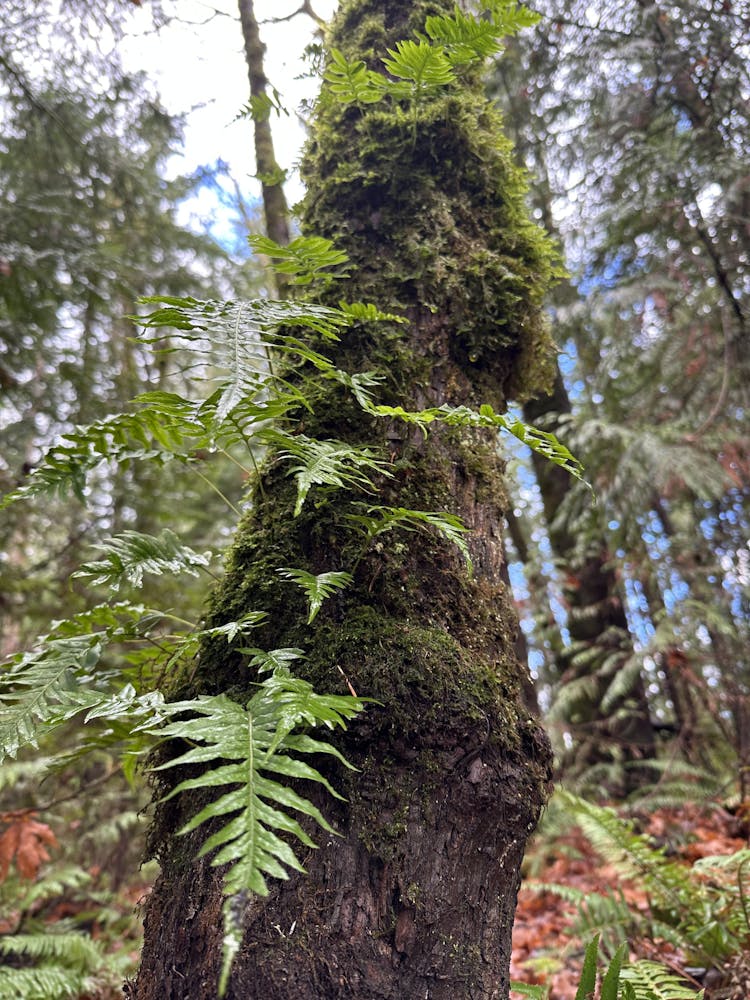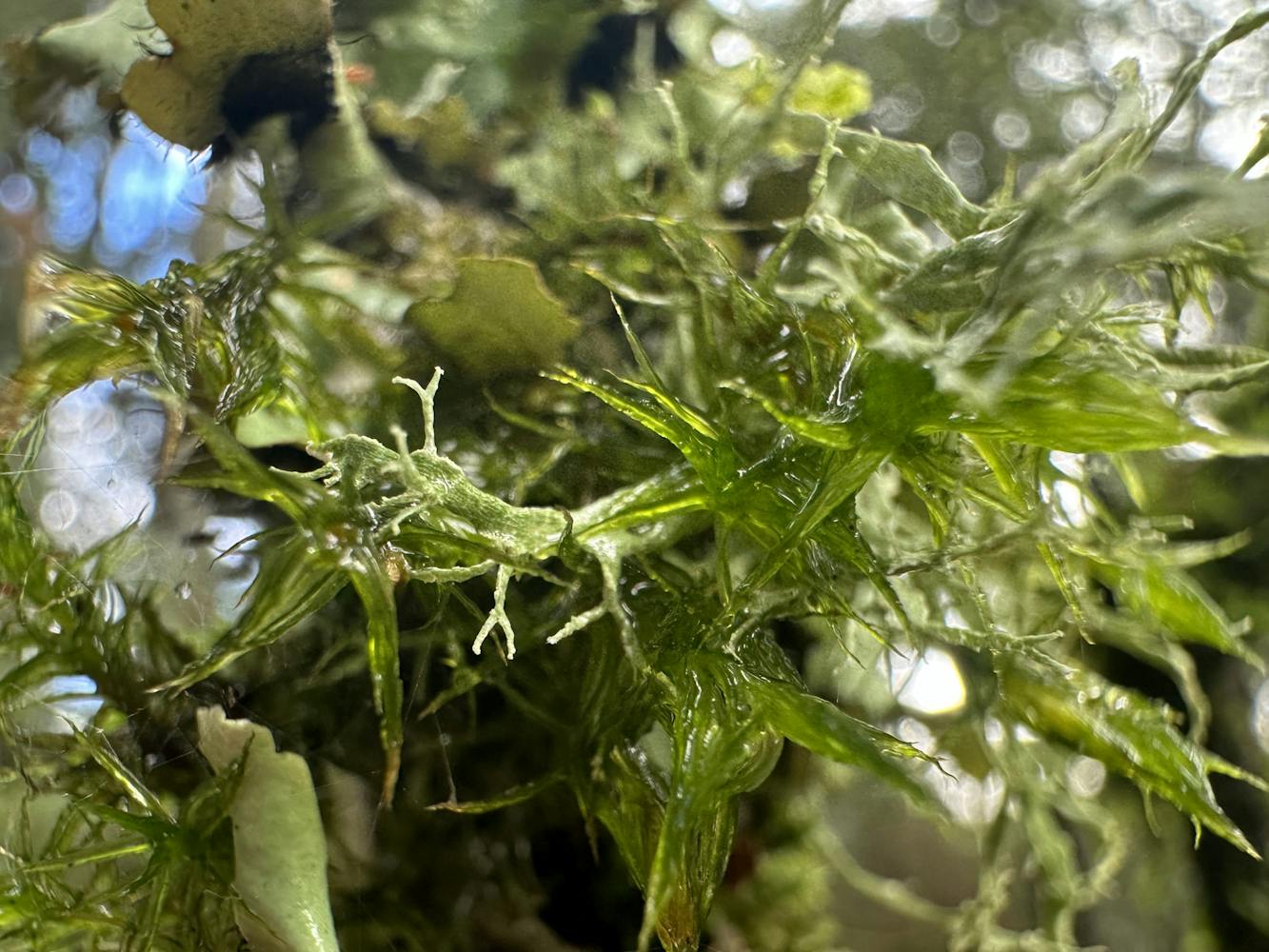One of my favorite things about Washington, and Bellingham in particular, is that you need not go far to find yourself deep in the woods.
There are endless beaches, forests, parks and trails to explore. But have you ever spent time in the woods and put your nose in the moss? Looked at leaves up close, felt the dirt in your toes? If you have, you may have experienced something known as forest bathing. I wrote an article for The Front in 2022 talking a bit about it.
Forest bathing, or, as it’s formally known, Shinrin-yoku, is the practice of bathing in the forest so to speak – intentionally taking in all the forest has to offer you. The term was coined in Japan, where the practice first emerged in the 1980s. It was developed as a physical and mental experience used to disconnect from the demanding outside world and get back in tune with the natural one.
There is tons of research on how forest bathing and nature itself can have healing properties both physically and mentally. For some, it is proven to lower stress, feelings of depression and even blood pressure.
“There's a theory, restorative theory of being out in nature that goes back to our ancestors and how we used to all be outside most of the time, and now that we have so many things taking our attention, it’s really restorative to get outside and just to have that variety of attention that is more natural,” said Elizabeth Nelson, programs director of Recreation Northwest, a nonprofit that promotes exploration and care of the outdoors.
Nelson helps manage the Parkscriptions program, which currently involves weekly outdoor field trips with Options High School students. She teaches students about using the five senses – usually excluding taste – to view nature in new ways. Sometimes students are provided with intentions to keep in mind as they “bathe” in the forest, though they refrain from referring to these excursions as forest bathing because it can confuse students.
“There are a lot of mental health benefits and that is what we focus on mostly," Nelson said. "We talk about resilience, talking about how plants are resilient.”
They talk about how plants need to adapt to changes in seasons and weather, how they get stronger and how students can apply that thinking to their own lives.
The actual act of forest bathing does not have to happen far into the forest. You can go to a park, or a beach, wherever you feel comfortable. The point of the practice is to be mindful and stay present in your surroundings. Notice the wind in the grass, the lichen on the tree trunks, a squirrel scampering from branch to branch.
Forest bathing doesn’t have to be a huge, in-depth endeavor – but it can be. April Claxton, owner of Among the Trees, her personal natural mindfulness business, offers guided forest bathing trips that last an hour or more.
“We start to transition into slowing down and getting present and then I have a variety of invitations, activities that we go through where we focus on just one sense at a time,” Claxton said.
She starts with touch because it inspires a sense of play that a lot of adults don’t often experience in their daily lives. She does sight last because it is such an overpowering sense we use and it has a tendency to dominate other sensations.
Even for Claxton, a one- or two-hour journey just isn’t realistic most of the time. In fact, she rarely goes that far unless she is guiding a group, though she will practice mini versions of her trips on her own when she can. Claxton grew up climbing trees as a kid – even in her adult life, she simply cannot stay away from them.
“Sometimes [nature] offers that connection and space for reflection, but also just, sometimes it’s pure joy and delight and pleasure and awe,” Claxton said. “I think sprinkling those moments into our lives is so important.”
Nelson said that watching a nature documentary or listening to nature sounds can mimic the experience of being outside. She also mentioned that being on your phone or having headphones in while in nature, especially when you are purposefully there to consciously immerse yourself into it, can hinder the experience.
“I never listen to music when I am running outside. I love being able to hear my heartbeat, strides and breaths. It is super grounding for me to be really present in nature when I am outside,” said Tell Short, a biochemistry major in his last quarter at Western. “Plus, I love looking around and people watching. I call running ‘mobile people watching.’”
Forest bathing looks different for everyone, whatever you are comfortable with. For Short, it’s trail running that allows him to plunge into nature and escape the grind of the day-to-day for a couple of hours. As long as you are present and making an effort to notice and just be, you can forest bathe anywhere.
I haven’t participated in a guided forest bathing walk, but I do get outside at least once a day for 30 minutes or more. I take my dog, Tula, on daily walks around Whatcom Falls Park. Recently, upon researching this topic, I decided to take my time on our walk and really pay attention to my surroundings.
I saw fungus and moss that I hadn’t noticed before, even though I walk the same trail pretty much every day. It gave me a small moment of awe and reminded me to be grateful for the little things.
I find going outside daily helps improve my mental clarity in a way that being inside or doing other relaxing, meditative activities doesn't provide. Even if I am not entirely present and I am in my head thinking about anything and everything, I still find it refreshing to be outdoors.
“We need those moments and there’s just no better container for modeling switching from doing to being, than nature,” Claxton said.
Sophie Bechkowiak (she/her) is writing for the opinion beat at The Front this quarter. She is in her fourth year at Western working towards a journalism news/editorial major and a philosophy minor. On her days off she enjoys thrifting, art, watching documentaries and goofing around with friends.
You can reach her at sophiebechkowiak.thefront@gmail.com.








